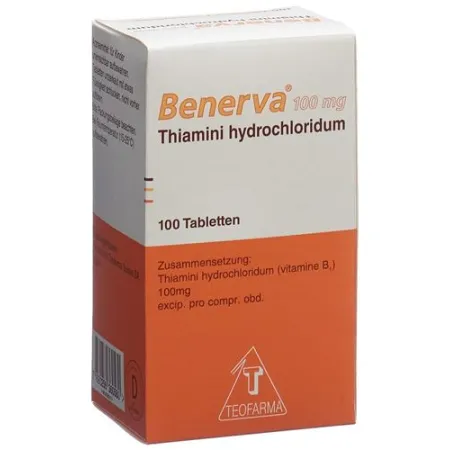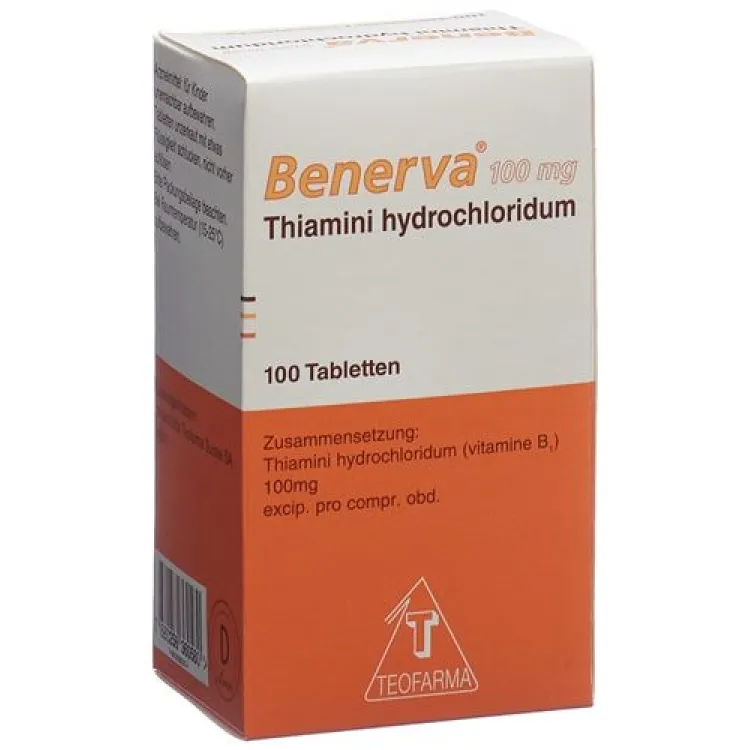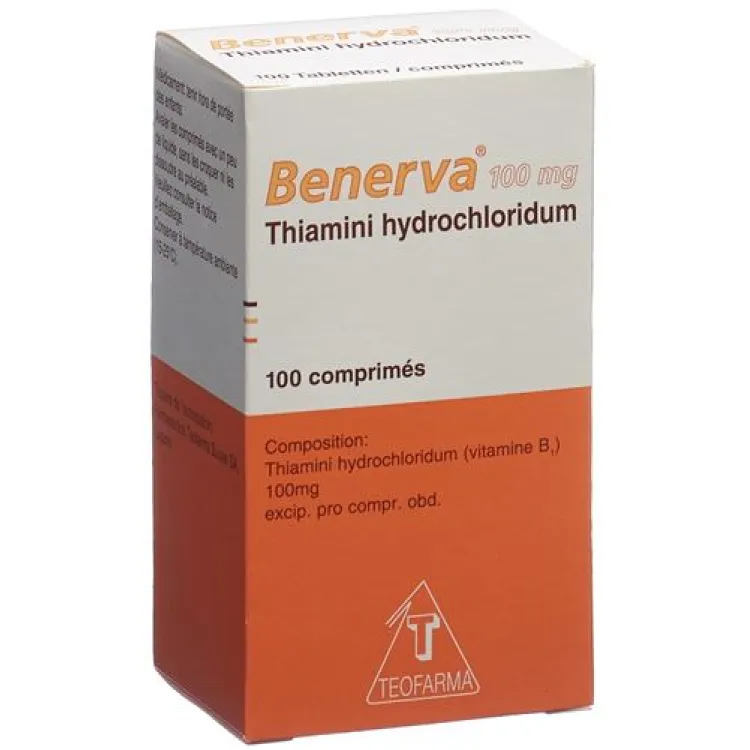Benerva tablets 100 mg 100 pcs
Benerva Tabl 100 mg 100 Stk
-
20.14 CHF

- Availability: Out of stock
- Distributor: TEOFARMA SRL
- Brand: Benerva
- Product Code: 2149634
- ATC-code A11DA01
- EAN 7680256360580
Ingredients:
Description
Vitamin B1 plays an important role in the breakdown of carbohydrates such as sugar and starch. For example, the organism needs around 0.2 mg of vitamin B1 to break down 100 g of chocolate. Vitamin B1 is also involved in the function of nerves and muscles. A lack of vitamin B1 thus leads to disorders in the utilization of carbohydrates, to nerve diseases and muscle weakness. Benerva is used to supplement an insufficient vitamin B1 intake with food and to cover an increased requirement.
Insufficient intake: Vitamin B1 is mainly found in the outer shell of grains and in yeast. A vitamin B1 deficiency can occur if you mainly eat finely ground grain flour instead of whole flour. Use in the event of a vitamin B1 deficiency requires the recommendation of a doctor or pharmacist.
Increased need: The need is increased in the case of insufficient absorption by the body as a result of gastrointestinal diseases, alcohol abuse, heavy physical work as well as during pregnancy and lactation.
Swissmedic-approved patient information
Benerva®
What is Benerva and when is it used?
Vitamin B1 plays an important role in breaking down carbohydrates such as sugar and starch. For example, the organism needs around 0.2 mg of vitamin B1 to break down 100 g of chocolate. Vitamin B1 is also involved in the function of nerves and muscles. A lack of vitamin B1 thus leads to disorders in the utilization of carbohydrates, to nerve diseases and muscle weakness. Benerva is used to supplement an insufficient vitamin B1 intake with food and to cover an increased requirement.
Insufficient intake: Vitamin B1 is mainly found in the outer shell of grains and in yeast. A vitamin B1 deficiency can occur if you mainly eat finely ground grain flour instead of whole flour. Use in the event of a vitamin B1 deficiency requires the recommendation of a doctor or pharmacist.
Increased need: The need is increased in the case of insufficient absorption by the body as a result of gastrointestinal diseases, alcohol abuse, heavy physical work as well as during pregnancy and lactation.
When not to use Benerva?
You must not take Benerva if you are allergic to any of its ingredients.
The tablets contain lactose and sucrose, so you must not take Benerva if you suffer from galactose or fructose intolerance, Lapp lactase deficiency, impaired absorption of glucose-galactose in the intestine or sucrase-isomaltase deficiency.
When is caution required when taking Benerva?
Benerva is also well tolerated in very high doses taken over a long period of time. Nevertheless, stick to the dosage instructions described below. Higher doses are useless as they are quickly excreted in the urine and sweat.
Medicines that neutralize gastric acid (antacids) inhibit the absorption of vitamin B1 in the intestine. It is also known that certain tuberculosis and preparations counteract vitamin B1.
Your doctor knows which preparations are involved. Ask him/her for advice if you are being treated with any of these medicines; He/she will be happy to provide you with information on how you can still cover your vitamin B1 requirement.
Tell your doctor, pharmacist or druggist if you
•suffer from other diseases,
•have allergies or
•Take other medicines (including those you bought yourself!) or use them externally.
Can Benerva be taken during pregnancy or while breastfeeding?
The vitamin B contained in Benerva may be taken in an amount that corresponds to the daily requirement 1 take during pregnancy and lactation. However, with daily doses such as those supplied with Benerva, you should only take this medicine after consulting your doctor.
How do you use Benerva?
Adolescents and adults: The tablets are best taken with a meal, whole, with liquid.
In the event of insufficient intake or to cover an increased requirement, 100 mg of vitamin B1 (1 tablet of 100 mg) daily or every other day is sufficient. In the case of more severe vitamin B1 deficiency states, your doctor will prescribe higher doses for you.
The use and safety in children under 12 years of age has not been systematically evaluated. Follow the dosage given in the package leaflet or prescribed by your doctor. If you think the medicine is too weak or too strong, talk to your doctor, pharmacist or druggist.
What side effects can Benerva have?
Allergic reactions such as itching, rash, nettle rash and skin swelling and asthma, but also disorders of the gastrointestinal tract such as nausea, vomiting , diarrhea or pain occur. Since excess vitamin B1 is quickly excreted, it cannot - in contrast to vitamins A and D - lead to excessive accumulation in the organism. On the other hand, it is possible that your skin smells of sulfur after very high doses, because the sulphur-containing vitamin B1 is also excreted with the sweat.
If you notice side effects that are not described here, you should inform your doctor, pharmacist or druggist.
What else needs to be considered?
The tablets should be stored at room temperature (15-25 °C).
The medicinal product should be kept out of the reach of children and should only be used up to the date marked «EXP» on the container.
Your doctor, pharmacist or druggist can provide you with further information. These people have the detailed information for specialists.
What does Benerva contain?
1 tablet contains:
Active ingredient: Thiamine hydrochloride (vitamin B1), 100 mg or 300 mg.
Excipients: The 100 mg tablets contain lactose and sucrose.
Approval number
25636 (Swissmedic)
Where can you get Benerva? What packs are available?
In pharmacies and drugstores without a doctor's prescription:
100 mg tablets: 100.
In pharmacies without a doctor's prescription:
300 mg tablets: 20, 100.
Authorization holder
Farmaceutica Teofarma Suisse SA, 6901 Lugano.
This leaflet was last checked by the drug authority (Swissmedic) in April 2019.





